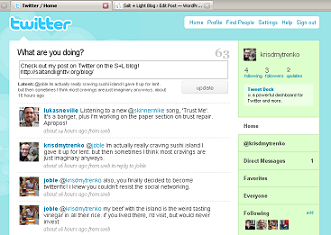"Twitter can make you immoral" screamed one headline last week. "Does Facebook fixation lower grades?" queried another. It seems that online networking sites are now under the critical eye of social scientists, who are eager to learn how new technologies are affecting human relationships.
Twitter, if you're still unfamiliar, is a web-based message board where users post 140-character real-time updates. The messages range from the banal —
which pasta to cook penne or bows arghh can't decide — to the intensely personal —
my fiancee just left me...what now?. Facebook similarly reduces profile updates into a "news feed".
Herein lies the problem, according to University of Southern California researchers: in a study of brain activity, short messages in rapid succession failed to stimulate lasting, emotional responses indicative of compassion. Yet there appears to be no stopping the social networking juggernauts: Facebook has now registered 200 million users, half of whom access their accounts daily. It has become so ubiquitous that young people no longer ask an acquaintance if he or she has an account — it’s simply assumed.
Even a 2000-year old Church — not prone to chasing fleeting trends — recognizes that the internet has ushered in a revolution in interpersonal relations. Pope Benedict XVI’s recent
Message for the 43rd World Day of Communications, titled "New Technologies, New Relationships: Promoting a Culture of Respect, Dialogue and Friendship", considered the risks and opportunities of new digital media.
Noting that young people "have an almost spontaneous affinity for the new means of communication," the Holy Father delegated to them "the responsibility for the evangelization of this 'digital continent.'" Foreseeing the concerns raised by the USC study, however, the pontiff warned that "it is important to focus not just on [new technologies'] undoubted capacity to foster contact between people, but on the quality of the content that is put into circulation using these means."
"Life is not just a succession of events or experiences," the Pope continued, calling to mind the Facebook and Twitter news feeds, "It is a search for the true, the good and the beautiful."
Are social networking sites capable of transmitting truth and beauty? The millions of young Catholics revealing their faith convictions online seem to believe they can. In a future post, I’ll share how three young Catholics are using Facebook as a contemporary tool of evangelization.
 "Twitter can make you immoral" screamed one headline last week. "Does Facebook fixation lower grades?" queried another. It seems that online networking sites are now under the critical eye of social scientists, who are eager to learn how new technologies are affecting human relationships.
"Twitter can make you immoral" screamed one headline last week. "Does Facebook fixation lower grades?" queried another. It seems that online networking sites are now under the critical eye of social scientists, who are eager to learn how new technologies are affecting human relationships.